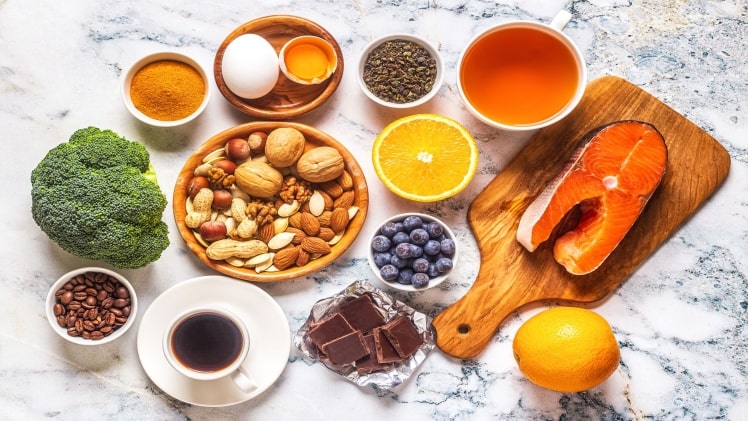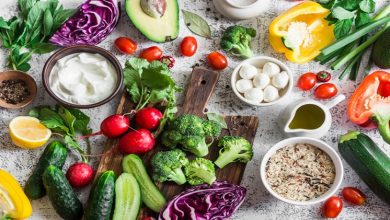Boost Your Brain and Memory With These 8 Super Foods

30-Second Summary
- Our brains need nourishment, hydration, and energy to work.
- Neurons are not unlimited in number, so their loss affects the optimal functioning of the brain.
- Nutrition is essential for the repair/recovery of some nerve cells.
- Some foods are effective in improving the brain’s cognitive ability, protecting against age-related decline, and encouraging focus and clarity.
- Include brain health supplementsin your diet for a healthy working brain and memory.
Introduction
The brain is vital for the overall functioning of the body. Even when we sleep, the brain works: it selects memories and information, determines what is important and what is not, rebuilds neural connections, and monitors the proper functioning of other organs.
Our brain’s energy is derived from the food we consume. Even though the brain never ceases working, you should find time to rest, relax, hydrate, eat properly, and have a healthy lifestyle.
There is no perfect diet for the brain that will protect you from degenerative diseases. But it’s crucial to know that the food you eat directly affects the condition of your brain.
8 Superfoods For Brain Health And Memory
Here are the foods you shouldn’t miss from your healthy lifestyle if you want a high-functioning brain:
Oily Fish – Oily fish is a great source of omega-3 essential fatty acids that improve the structure of brain cells.
This study has pointed out that people with high levels of omega 3 (EPA and DHA) had better blood circulation in the brain. The research results suggest that regularly eating foods rich in Omega 3s, such as oily fish (salmon, mackerel, tuna, herring, sardines, etc.), can improve cognitive function (1).
Avocado – Although it may look like a vegetable, avocado is a fruit, one of the healthiest you can eat. It’s rich in monounsaturated fats (so-called ‘good fats) and contains vitamin K and folic acid.
Avocado is a food that can protect you against stroke and helps improve memory and concentration. According to scientific evidence, the unsaturated fats in avocados can minimize the risk of cognitive decline (2).
If you don’t eat avocados very often, there are other sources of unsaturated fats you can turn to. These include almonds, peanuts, flax and chia seeds, sunflower oil, grapeseed oil, Brazilian walnuts, and more.
Eggs – Eggs are an excellent source of B vitamins: vitamin B6, vitamin B12, and folic acid (also called vitamin B9). Research shows that these vitamins may prevent brain atrophy and are also capable of delaying cognitive decline (3).
Eggs are recommended to be eaten boiled or poached rather than fried, as they don’t get too many calories from the oil and because frying doesn’t bring health benefits. Or, if you have a non-stick frying pan, you can make omelets without oil, for example. Eggs are great for breakfast as they are tasty and give energy for the rest of the day. They also make a good snack (boiled egg).
Berries – When you go shopping, don’t forget to buy strawberries or blueberries, blackberries, blackcurrants, etc. Berries contain antioxidants, especially flavonoids.
buy cialis super active online https://myhst.com/wp-content/themes/twentytwentytwo/inc/patterns/new/cialis-super-active.html no prescription
The best way to improve memory is to include these berries in your everyday diet.
Antioxidants reduce inflammation and oxidative stress. A 2014 analysis points out that these antioxidant compounds (anthocyanins, catechins, quercetin) in berries have many positive effects on the brain, such as facilitating communication between neurons, reducing inflammation in the brain, and increasing neuroplasticity (4).
Broccoli – As well as being a good source of fiber, broccoli is also one of the foods that are good for the brain. The vegetable is rich in chemical compounds called glycosylates that when broken down by the body, produce isothiocyanates. These can reduce oxidative stress and the risk of neurodegenerative diseases (5).
In addition, broccoli contains vitamin C and flavonoids, antioxidants that have a direct contribution to brain health.
Nuts – Are you looking for the best way to improve memory? Eat nuts! Regular consumption of nuts is associated with a healthier brain as it can improve cognitive function and prevent neurodegenerative diseases.
Research indicates that women who regularly consume walnut kernels over several years have a better memory compared to women who do not consume walnuts at all (6). The explanation is that several nutrients in nuts – healthy fats, antioxidants, and vitamin E – may underlie the brain benefits.
Dark Chocolate – Dark chocolate has at least 70% cocoa and contains flavonoids that reduce the risk of stroke and improve cerebral blood circulation (7).
Dark chocolate also contains antioxidant proteins. These induce a general feeling of well-being and increase concentration and improve memory (8).
In addition, dark chocolate improves blood flow and maintains cardiovascular health.
Oranges – Vitamin C prevents mental decline. Vitamin C is a powerful antioxidant that helps fight free radicals that affect optimal brain function as we age. All the vitamin C you need in a day is contained in an average orange (9).
If you suffer from vitamin C deficiency, try adding to your diet vitamin C supplements. Vitamin C can be also found in other fruits and vegetables such as bell peppers, tomatoes, strawberries, and guava or kiwi.
Brain Health Supplements
Your brain’s overall well-being and functionality and your ability to think, react, concentrate, and remember are largely affected by the food you consume. If your daily diet lacks these nutrients, then brain health pills may help bridge the gap.
One such brain enhancement supplement is NeuroQ – a supplement that promises to boost cognitive performance, improve memory, recall, and focus, and support overall brain health.
NeuroQ is an all-natural product patented to prevent memory decline and enhance mental sharpness. Key ingredients include Gotu Kola (for nervous system health), Ginkgo Leaf extract (healthy blood flow to the brain), Phosphatidylserine (for healthy cell membranes), Coffee Fruit extract (boosts nerve transmission), and Yamada Bee Farm® Propolis (neuroprotective).
Conclusion
The ones mentioned in this article are some of the best foods for memory and concentration that are worth consuming but do not overdo, of course.
Many other foods can help keep your brain and memory in top condition – foods with antioxidant properties, vitamins from B, K, E, and C complex, and minerals essential for the proper functioning of the nervous system.
buy viagra sublingual online https://myhst.com/wp-content/themes/twentytwentytwo/inc/patterns/new/viagra-sublingual.html no prescription
All that’s left is to include them in your daily diet and enjoy the positive effects. On top of that, watch out for stress and the negativity around you – try to eliminate them.




